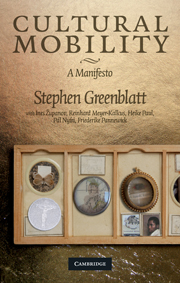Book contents
- Frontmatter
- Contents
- List of authors
- List of illustrations
- Acknowledgments
- 1 Cultural mobility: an introduction
- 2 “The Wheel of Torments”: mobility and redemption in Portuguese colonial India (sixteenth century)
- 3 Theatrical mobility
- 4 World literature beyond Goethe
- 5 Cultural mobility between Boston and Berlin: how Germans have read and reread narratives of American slavery
- 6 Struggling for mobility: migration, tourism, and cultural authority in contemporary China
- 7 Performativity and mobility: Middle Eastern traditions on the move
- 8 A mobility studies manifesto
- Index
3 - Theatrical mobility
Published online by Cambridge University Press: 05 June 2012
- Frontmatter
- Contents
- List of authors
- List of illustrations
- Acknowledgments
- 1 Cultural mobility: an introduction
- 2 “The Wheel of Torments”: mobility and redemption in Portuguese colonial India (sixteenth century)
- 3 Theatrical mobility
- 4 World literature beyond Goethe
- 5 Cultural mobility between Boston and Berlin: how Germans have read and reread narratives of American slavery
- 6 Struggling for mobility: migration, tourism, and cultural authority in contemporary China
- 7 Performativity and mobility: Middle Eastern traditions on the move
- 8 A mobility studies manifesto
- Index
Summary
In the twilight of the last millennium I was gripped, like many of my contemporaries, by a powerful sense that something decisive had happened to the world into which I was born. The Cold War, which had conditioned my entire consciousness of the world, from the time I was instructed as a child to hide under the desk and close my eyes in the event of a Russian nuclear strike, had suddenly and unexpectedly come to an end. New nations were springing up everywhere, and the old repressive regimes were being toppled by constitutional democracies. The whole map of the world was being redrawn, and not only in the political sphere. The mapping of the human genome had begun decisively to prove that race, which had seemed so tragically determinative of human destiny, was a sinister set of fantasies based on pseudo-science and vulgar superstition. It turns out that we are all African by descent and that we are virtually all genetically mixed, such tiny differences as actually exist misunderstood, reified, and given fraudulent and twisted explanations.
It is not only race that was revealed to be largely illusory; religious, ethnic, national, and linguistic ideas of purity also seemed to lose their force and to appear now as merely imaginary constructs created by braiding together diverse fantasies and then conveniently forgetting both the act of braiding and the fantastic nature of the braided elements.
- Type
- Chapter
- Information
- Cultural MobilityA Manifesto, pp. 75 - 95Publisher: Cambridge University PressPrint publication year: 2009
- 1
- Cited by

